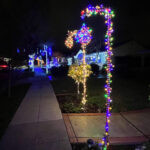The San Francisco 49ers, icons of NFL glamour and success in the 1980s, honed their championship pedigree in a setting that was anything but opulent. Their training ground, affectionately nicknamed “7-11,” was situated at 711 Nevada Street in Redwood City, a modest, almost hidden, location in a quiet suburban neighborhood.
This wasn’t the state-of-the-art, sprawling complex one might expect for a team of their stature. Instead, the 49ers practiced in a rustic, two-story building on Nevada Street, surrounded by unassuming family homes. Red Morton Park, the adjacent playing field, was nestled under towering redwood trees, sharing space with a community swimming pool and a little league baseball field. This down-to-earth environment was a far cry from the glitz and glamour associated with the team’s burgeoning dynasty.
Despite the humble facilities at 711 Nevada Street, the 49ers achieved remarkable success. As legendary lineman Jesse Sapolu famously quipped, “We won two Super Bowls practicing on a 50-yard field.” While technically it was a full 100-yard field divided into two 50-yard sections, one grass and one artificial turf, his point resonated deeply. Compared to the lavish training facilities of other NFL teams, the Morabito Memorial Fieldhouse at Nevada Street was remarkably small and basic.
Jerry Walker, the 49ers public relations director during their Super Bowl era, emphasized the stark contrast: “The entire facility at 711 Nevada Street could fit into the 49ers current weight room in Santa Clara.” The spartan conditions extended to the locker room as guard Guy McIntyre humorously recalled the primitive shower system: “If players were in the shower and someone flushed the toilet we yelled ‘fire in the hole’ to warn them because the water would get super-hot really fast.”
Parking at 711 Nevada Street was equally reflective of the no-frills atmosphere. With minimal on-site parking available, even high-profile quarterbacks found themselves competing for street parking with local residents going about their daily routines. Yet, this lack of pretension fostered a unique connection with the Redwood City community.
“There was a real family type environment at 711,” Walker explained. “They made us feel at home. Players signed autographs and mingled with the kids.” The neighbors embraced the team, feeling like they were part of the 49ers family. One memorable anecdote perfectly illustrates this community bond. Walker recounted, “One time (coach) Sam Wyche left the week’s game plan on top of his car and drove away. Sheets of paper were flying all over the place. One of the neighbor kids comes running into the office yelling ‘I need help, I need help. The plays are scattered all over the street.’ He was concerned about us losing the game plan.”
The accessibility of 711 Nevada Street was also striking. Passersby could simply walk up to the front door and find themselves just steps away from team owner Eddie DeBartolo’s office. Head coach Bill Walsh and vice president John McVay’s offices were located upstairs, overlooking the practice field from a second-floor balcony. Walker shared a story from that balcony, recalling a conversation with Walsh where the coach pointed out a walk-on player: “You see that blonde-haired guy? He’s going to be a lot better than you think.” That player was Bill Ring, a local talent from Belmont’s Carlmont High School who, despite being undrafted, impressed Walsh with his dedication and grit. Ring went on to play six seasons with the 49ers, earning two Super Bowl rings and becoming a beloved fan favorite.
711 Nevada Street served as the 49ers headquarters from 1956 to 1988, a period that spanned significant eras in the team’s history. During this time, many players lived in the surrounding Redwood City and San Carlos areas, becoming integral parts of the community. They frequented local businesses, attended churches, and participated in neighborhood events. George’s Barber Shop in San Carlos even hosted informal “49ers Saturday” gatherings, where fans could meet and mingle with players like Charlie Krueger and Frank Morze.
The Canyon Inn, a restaurant just a short drive from 711 Nevada Street, became another important community hub for the team. Owner Tim Harrison, eager to support his local team, offered free meals to players and staff after every victory in 1981. This generous offer inadvertently became a tradition as the 49ers embarked on their Super Bowl-winning season. “Tim was incredibly generous. Win or lose, some guys ate there every day,” Walker remembered.
Harrison himself recalled a humorous encounter that highlighted the unassuming nature of even NFL players in the Nevada Street era. He recounted the story of Bill Ring: “One day a guy comes in with his date and he’s a little guy, his head is barely over the counter. He orders a burger and hands me the card that says Bill Ring. I told him only players could use the cards. He said ‘I am Bill Ring.’ I felt bad. He looked like an average guy. I couldn’t believe he was a player.”
In retrospect, the unpretentious setting of 711 Nevada Street played a unique role in shaping the San Francisco 49ers dynasty. It fostered a sense of community, grounded the team in humble values, and proved that championship dreams could be built even in the most unassuming of places. The memories and stories from Nevada Street remain a cherished part of 49ers history, a testament to the team’s roots and the enduring spirit of that special era.

